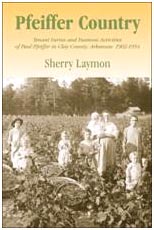Every southern county holds tight to its history. Secrets, rumors, successes, and scandals lie hidden behind the vault of history, either fast fading from public memory or continually shifting in popular representation with the steady passage of time. For decades the history of Clay County in northeastern Arkansas, a corner of the state’s Delta region, has lay hidden and in need of its own interpreter. Its stories of entrepreneurial landowners, innovative farming, and remarkable heroism during the Great Depression sat untold. But no longer. Sherry Laymon unlocks the past of this fascinating corner of the South through a meticulous sifting through manuscripts, diaries, census records, architectural diagrams, and newspaper accounts.
Focusing on the first half of the twentieth century, Laymon argues that Paul Pfeiffer, son of German immigrants and Mid-western businessman, dominated the modern settling of Clay County. Shortly after falling in love with the area while touring it by rail in the late 1800s, he purchased tens of thousands of acres, hired crews to clear and drain them, and recruited farmers to plant and harvest cotton. What makes Pfeiffer’s exploits so unusual, as Laymon demonstrates, was his ability to create a local culture unlike most found in the South. Unlike his peers, Pfeiffer offered tenant farmers and sharecroppers ample plots of land, generous terms of credit, large well built homes, and up to one acre each to plant subsidiary crops. Mules and horses were readily available. Less sanguinely, he participated in efforts to block African Americans from immigrating to this part of the Delta, as was the case in the region as a whole. Still, he never became the conniving, rapacious landowner so common during this era of the New South, one who encoiled his workers in a downward spiral of debt and dependency that doomed them to lives as members of a permanent property-less class. Indeed, during the Great Depression, he freely allowed his workers to suspend loan payments and gave away supplies and food. More unusual, he eventually sold his land holdings at rock bottom prices to his workers, affording them rare access to land and the opportunity to join the ranks of stakeholders.
Richly researched and expertly written, Pfeiffer Country offers unusual access to the Southern past. Painstakingly searching through the documentary paper trail left by Pfeiffer himself, Laymon brings to life a little glimpsed version of history in which society evolved under the strong hand of a leader committed to sharing his bounty and good fortune with his fellow white citizens. It stands as a useful reminder that southern counties have distinctive trajectories and should not be viewed through any universal prism of interpretation.
John M. Giggle
Assistant Professor of History and African-American Studies
University of Alabama

